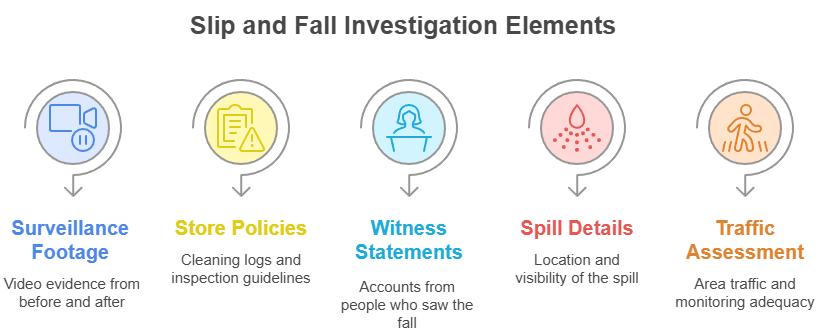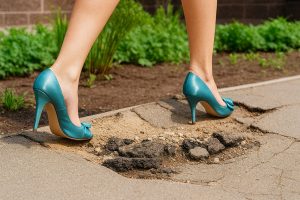Who Pays When a Customer Causes a Slip & Fall Hazard in a Texas Store?
You already know how fast it can happen. One second you’re walking through the store, and the next, you’re on the ground in pain. Later you find out someone else, not the store, spilled something. Maybe it was a dropped drink, a leaking bottle, or a knocked-over item. Now you’re left wondering who’s actually responsible for your injuries and whether you have any chance at a fair settlement.
The store employees didn’t cause the spill. But they didn’t clean it up either. So are they still on the hook?
Yes, they can be. In Texas, stores can still be legally responsible for customer-caused hazards if they had enough time and opportunity to fix the issue and failed to act. In this article, we’ll walk you through how that works, what Texas law actually says, and how Genthe Law Firm helps people like you take the right next step after a painful fall.
Premises Liability 101: What Texas Law Says About Store Responsibility
Stores are required to keep their property reasonably safe for customers. That doesn’t just apply to spills caused by their own employees. It includes any dangerous condition, even one created by another shopper.
Texas law says that if a store knew about a hazard, or reasonably should have known about it, they have a duty to address it. That includes mopping it up, placing a warning sign, or blocking the area off. If they fail to take action and someone gets hurt, they can be held legally responsible.
You don’t have to prove the store caused the problem. You have to prove they had a chance to fix it and didn’t.
Spills Caused by Other Customers: The “Actual or Constructive Knowledge” Test
In slip and fall cases, Texas courts use what’s called the “actual or constructive knowledge” standard. That’s what determines whether a store is liable, not who made the mess.
Here’s how it works:
- Actual knowledge means the store staff saw the spill or were told about it and didn’t act.
- Constructive knowledge means the spill was there long enough that a reasonable store should have known about it, even if no one directly pointed it out.
Let’s say someone spills a soda on the floor in the produce section. If that spill sits there for 15 to 30 minutes and no one cleans it up, that’s constructive knowledge. If the store doesn’t have regular inspection routines or skips their cleanup checks, they’re still responsible.

To prove this, our team looks at:
- Surveillance footage of the area before and after the fall
- Store cleaning logs or inspection policies
- Witness statements
- The location and visibility of the spill
- Whether the area was high-traffic and should have been watched more closely
Even when another customer caused the danger, the store still has a legal obligation to act quickly. If they didn’t, we can hold them accountable.
What Stores Usually Say and Why It Doesn’t Always Hold Up
If you’ve already reported the fall or spoken to the manager, you may have heard something like, “It wasn’t our fault, another customer did it.” That might sound final, but it’s not. In fact, it’s one of the most common tactics used by stores to avoid responsibility.
Here’s what’s really going on. Stores often use this line as a way to shut down a claim early. They’re betting you’ll accept the explanation, feel unsure about your rights, and move on without pushing further. But Texas law doesn’t give stores a free pass just because someone else made the mess.
The key issue isn’t who caused the spill. It’s what the store did about it – or didn’t do. If employees walked past the spill and ignored it, if no one inspected the area for 30 minutes, or if the store didn’t follow its own safety procedures, that’s negligence. And negligence is what creates legal responsibility.
Even if a spill happened only a few minutes before your fall, that may not be enough to let the store off the hook. Certain areas, like entranceways, produce sections, and self-checkout zones, are known for frequent spills or clutter. Stores are expected to monitor these high-risk areas more closely.
That’s why quick action is so important. The longer you wait, the more likely it is that video evidence disappears, employees forget what happened, or the store shifts the story. The sooner you contact a lawyer, the more we can do to preserve the truth and build a case that holds up.
If the store is trying to brush you off or downplay what happened, don’t assume they’re right. Let us take a look, dig into the facts, and fight for the accountability you deserve.
What You Should Do After a Slip and Fall Caused by Another Customer’s Spill
If this has already happened to you, here’s what we recommend doing right away or as soon as possible:
- Get medical care. Even if you think you’re fine, some injuries show up later, especially soft tissue or head injuries.
- Write down everything you remember. When did the fall happen? What exactly was on the floor? Did anyone say anything at the time?
- Ask for the incident report. Stores should provide a copy or allow you to review it.
- Get witness names and contact info. Other shoppers may have seen the spill or heard employees talk about it.
- Contact Genthe Law Firm. We’ll take it from here.
Time is key. Surveillance video is often erased after just a few days. Don’t wait to get legal advice.
How Genthe Law Firm Proves Store Negligence in Complex Cases
We don’t just file claims. We build strong, evidence-based cases designed to hold stores accountable, even in gray-area situations like customer-caused spills.
Here’s what we do:
- Request store surveillance video immediately
- Demand cleaning logs and inspection reports
- Interview employees and other witnesses
- Hire experts, if needed, to explain what the store should have done
These cases often come down to timing. Our job is to show that the store had a chance to fix the hazard and didn’t.
FAQ: Specific Situations You Might Be Facing
I slipped on something I didn’t see. Does that hurt my case?
Not necessarily. If the spill wasn’t clearly visible or was in an unexpected place, that can actually support your claim.
A child spilled something, and I fell on it. Can I still sue the store?
Yes. The store’s duty to maintain safe conditions doesn’t change just because a child caused the hazard.
I was told to file a claim with the store’s insurance, but they denied it. What now?
That’s where we come in. Insurance companies often deny valid claims. We handle the appeal, gather the right evidence, and fight back.
The store cleaned up the spill right after I fell. Can I still prove what happened?
Yes. But it’s more important than ever to act quickly. We can use photos, witness statements, and video footage to establish what happened before cleanup.
I slipped on a spill that looked old. Does that help my case?
Yes. If the spill was sticky, discolored, partially dried, or had footprints through it, that can help prove it was there long enough for the store to have noticed and cleaned it up. These details can be critical in showing constructive knowledge.
A store employee walked by the spill before I fell. Can I use that as evidence?
Absolutely. If an employee saw the hazard and ignored it, that counts as actual knowledge. We can request video footage or seek witness testimony to support your claim.
There was a wet floor sign nearby, but not near the spill I fell on. Can I still file a claim?
Yes. A sign in the wrong location does not protect the store from liability. If the warning didn’t clearly apply to the spill you slipped on, the store can still be held responsible.
I was wearing flip-flops when I fell. Does that affect my case?
Maybe, but it doesn’t automatically disqualify you. The focus is still on whether the store failed to fix or warn about a dangerous condition. We’ll evaluate footwear concerns along with the full set of facts.
The store said they threw away the video. Can I still prove what happened?
Possibly. If video was deleted too soon, that may work against the store. We can use employee statements, other customers’ accounts, and photos from the scene to build your case. But this is why acting quickly matters.
The manager apologized to me after the fall. Can that be used in my case?
Yes. While apologies don’t always equal admission of liability, they can support your account and show that the store recognized something went wrong. We document all these interactions.
Talk to a Dallas Slip and Fall Lawyer Who Knows How to Win These Cases
If you’ve been injured because of a spill caused by another customer, the store may still be responsible. They had a duty to monitor the area, clean up hazards, and keep you safe. If they failed to do that, you shouldn’t be left dealing with the consequences alone.
At Genthe Law Firm, you’ll work with a Dallas slip and fall lawyer who understands the ins and outs of Texas premises liability law. We act quickly to preserve video, interview witnesses, and build a strong case on your behalf. Our goal is simple: get you the compensation you need to recover and move forward.
Call us today at (214) 957-0898 for a free consultation. You pay nothing unless we win your case. Let’s make sure the store is held accountable, and you’re not stuck paying the price for their inaction.
Page Contents
- Who Pays When a Customer Causes a Slip & Fall Hazard in a Texas Store?
- Premises Liability 101: What Texas Law Says About Store Responsibility
- Spills Caused by Other Customers: The “Actual or Constructive Knowledge” Test
- What Stores Usually Say and Why It Doesn’t Always Hold Up
- What You Should Do After a Slip and Fall Caused by Another Customer’s Spill
- How Genthe Law Firm Proves Store Negligence in Complex Cases
- FAQ: Specific Situations You Might Be Facing
- Talk to a Dallas Slip and Fall Lawyer Who Knows How to Win These Cases



